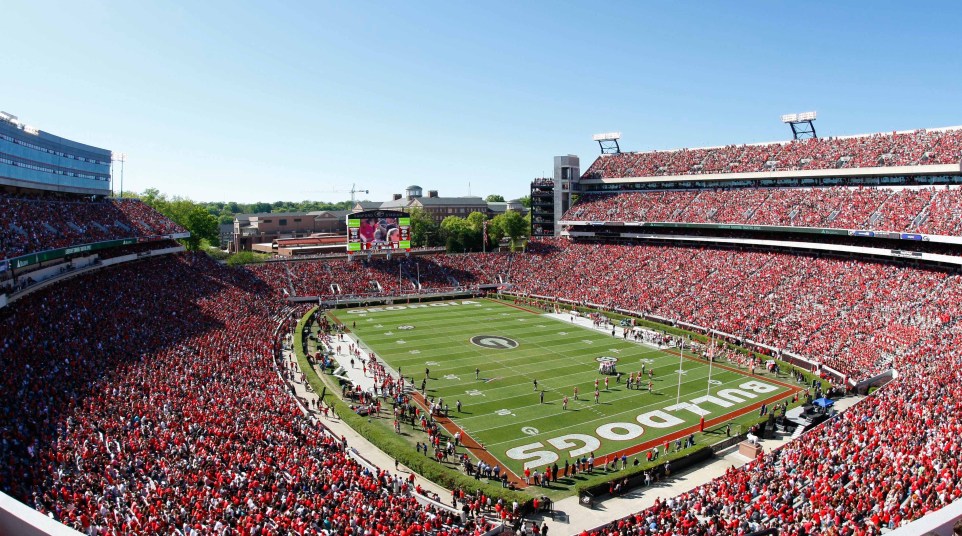
Teams with most offseason buzz in Georgia history
Georgia did the unfathomable, cramming 93,000 fans into Sanford Stadium for a spring scrimmage simply because the head coach requested it.
It made many believe new coach Kirby Smart has already made waves within the Bulldogs fan base that Mark Richt couldn’t during his entire 15 years. That may or may not be the case. Others sense that Jacob Eason’s debut forecasted success (and rings) to come in Athens. Again, still very much up in the air.
But inarguable is the buzz around the program heading into the 2016 season.
For a team that fired its coach, Georgia sure doesn’t feel like a program worried about growing accustomed to a new situation. The recruiting is as fervent as ever, and the results are showing up in the form of top in-state talent.
A 10-win team a season ago, the Bulldogs don’t fit the mold of a team with a new coach looking to rebuild into an SEC power. And that’s because they aren’t. The results under Smart remain to be seen, but the passion in and around the program is almost unmatched when it comes to other offseasons in Georgia history.
But, often considered one of the more underachieving teams in the nation, the Bulldogs aren’t completely strangers to lofty preseason hype. Since the national championship in 1980, there were two seasons that modeled the 2016 offseason in many regards.
1982: Oh, so close
Funny enough, the one championship the Bulldogs did get in the modern era came as a major surprise.
For a program that has become the poster child for disappointing its fan base, the team that won the 1980 national championship didn’t enter the season with any kind of formidable national title hopes.
They opened that season ranked No. 16. They didn’t receive a first-place vote until November.
And even throughout the season, they didn’t always look the part of champion, winning one-possession games against Tennessee, Clemson, Ole Miss, South Carolina, Florida and Notre Dame. After the 12-0 season, even with the amazing freshman Herschel Walker returning, you’d think the 1981 season was the offseason with major buzz, and it likely had its moments, considering the team ended up falling in the Sugar Bowl to Pittsburgh.
But the 1982 season seemed like the one destined to bring another trophy to Athens.
Even with the departure of Buck Belue, Bulldog Nation believed Walker to be the greatest college football player ever. And with two strong seasons, and no Heisman Trophy yet, Georgia believed that meant the award was his to lose, and with the trophy it implied a national championship would follow.
The Walker buzz didn’t end during the season, and neither did the national championship pride. Walker won the Heisman, though it shouldn’t have been his first. And the offseason buzz was correct: Walker’s dominance, with a sub-par passing game, did piggyback into a national championship opportunity. The rest, however, is history.
The Bulldogs entered the Sugar Bowl undefeated and ranked No. 1 but fell by four to the No. 2-ranked Nittany Lions. So, it wasn’t an offseason for naught, but it set the tone for the letdowns that followed.
2008: Preseason No. 1 to … letdown
This is the one that got away — and it’s likely when Georgia fans unfairly turned on Mark Richt for good.
Georgia entered the season ranked No. 1. The Bulldogs won SEC championships in 2002 and 2005, and many believed Georgia was the best team in the nation, not just the conference, at the end of the 2007 season.
And the stars was returning: Matthew Stafford, Knowshon Moreno, Mohamed Massaquoi, Geno Atkins, Rennie Curran, Akeem Dent, Asher Allen, the whole lot. And then there was the incoming freshman class, perhaps the best of Richt’s tenure, headlined by A.J. Green.
Everything seemed in place. Who could be a team like that?
An upstart Alabama team under Nick Saban that Georgia had beaten in Tuscaloosa the year before? A Tim Tebow-led Florida team that handed Georgia one of its rare 1990-2007 wins in Jacksonville the season prior? An in-state rival that seemed like a high school team against Richt-led Georgia teams?
The answer: yes, yes and yes.
Georgia maintained that buzz into the season, winning its first four games, even though those victories weren’t impressive enough to keep the Bulldogs atop the polls. Then came the funeral game in Athens, where Saban launched the Crimson Tide into an impending dynasty with a first-half shellacking of the Bulldogs. Few choose to remember the 30-13 second half Georgia put together, mostly because it didn’t matter.
The Bulldogs already proved to any doubters that hype in Athens is almost always too much.
